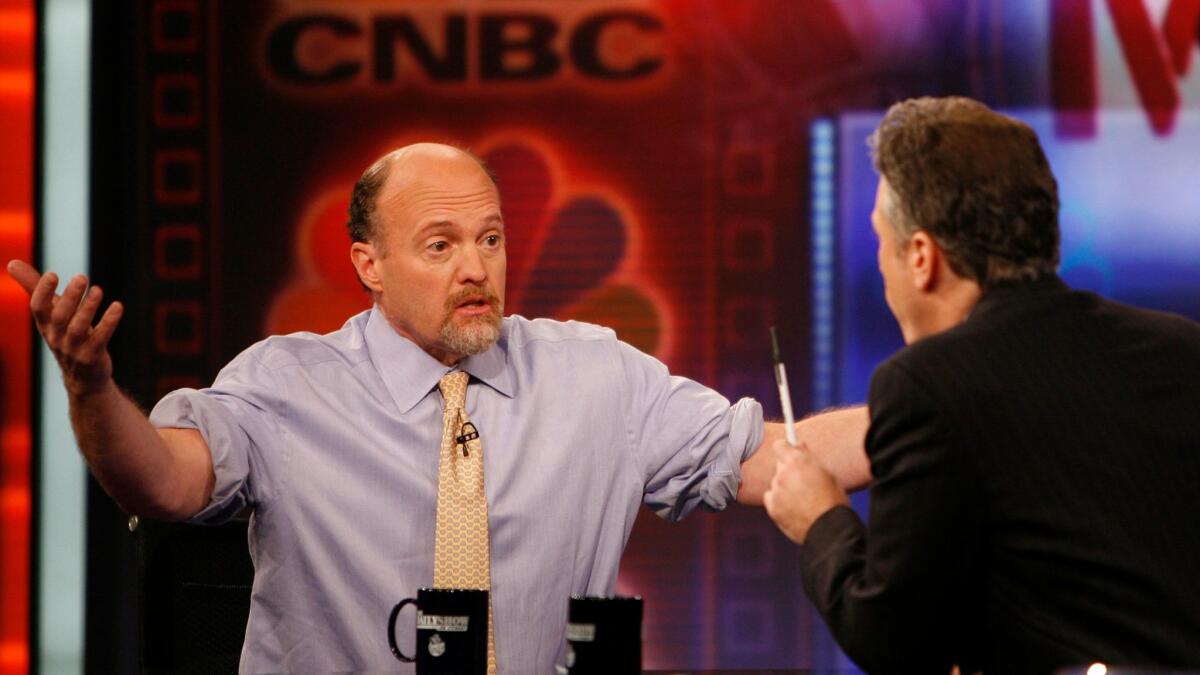After a long slide, Jim Cramer’s TheStreet could be delisted for its low stock price

In 2007, investor news site TheStreet Inc. was riding high as many sought information about the looming financial crisis.
But since then, the New York publication’s fortunes have steadily declined, pushed down by falling ad revenue and an increasingly competitive financial news landscape.
The company’s shares, which traded as high as $36 in 1999, closed Wednesday at 84 cents.
The downturn culminated earlier this month in a warning that the company could be delisted from the Nasdaq Global Market after its stock closed below $1 a share for 30 consecutive business days.
The company has until June to turn things around, it said in a filing this month with the Securities and Exchange Commission.
If the price of TheStreet’s stock closes at $1 per share or higher on at least 10 consecutive business days, the company will not be delisted. Even if the price does not improve, TheStreet can appeal before the delisting occurs.
TheStreet declined to comment beyond what was in the SEC filing.
TheStreet launched in 1996 as a paid subscription site for financial news and commentary. It was co-founded by Jim Cramer, who is now host of CNBC’s “Mad Money” TV show; he is on TheStreet’s board of directors and still contributes articles and videos to the site.
On May 10, 1999, at the height of the Internet stock craze, the company launched its initial public offering. Three weeks later, it hit an all-time high of $36 a share.
By December 2007, TheStreet’s shares were still trading at $15.92. At the time, plenty of businesses were willing to pay to get financial information.
“All the financial services did well,” said Scott Gurvey, former New York bureau chief of PBS’s Nightly Business Report television program. “People wanted to know what to do.”
But soon Internet giants Facebook and Google began sucking up digital advertising dollars, and more competitors entered the business-to-business financial news market.
Today TheStreet competes with financial news services such as Bloomberg and CNN Money, as well as investor newsletters including the Motley Fool.
“It’s a different ballgame now with fewer players … to subscribe,” said Gabriel Kahn, co-director of the Media, Economics and Entrepreneurship program at USC.
TheStreet’s services have also been affected by the move toward high-frequency trading that relies on powerful computers and algorithms to make transactions in fractions of seconds. Demand for editorial products aimed at businesses, like the news service peddled by TheStreet, has suffered, Kahn said.
TheStreet this year shook up its executive ranks. In February, the company’s president and chief executive, Elisabeth DeMarse, resigned after four years. A reason was not given at the time of her departure.
In June, media industry veteran David Callaway was appointed CEO. He was most recently editor in chief of USA Today.
For more business news, follow me @smasunaga
ALSO
Photoshop is hard to learn. Adobe thinks artificial intelligence can help
Chinese investors were defrauded by Orange County lawyer, SEC says
‘L.A. Law’ building owners launch update of office tower with high-rise courtyards
UPDATES:
2:30 p.m.: This article was updated with comment from analysts.
This article was originally published at 9:50 a.m.
More to Read
Inside the business of entertainment
The Wide Shot brings you news, analysis and insights on everything from streaming wars to production — and what it all means for the future.
You may occasionally receive promotional content from the Los Angeles Times.











